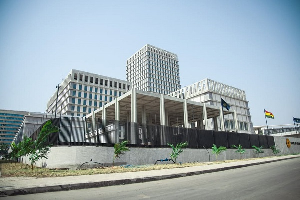Opinions of Friday, 12 May 2006
Columnist: Agbodza, Paul
No Malaria- Longer Life Span in Ghana!!!
Malaria is the single most important and widespread cause of death in Ghana. It is the most reported case of disease in rural areas in the last ten years.
The Independent reported in its 22 September 1999 edition on a National Seminar held in Accra on Environmental Management for Malaria Control that Malaria dominates OPD cases in Ghana. It accounts for over 40% of all OPD cases in all hospitals and other health institutions and about 25% of under-five mortality in Ghana. And it is the single most important cause of death in the country.
In the 03 Nov. 2005 edition of the Daily Graphic, it was reported that 2,000 pregnant women and 15,000 children below the age of five died of malaria in 2004. The Minister of Health reported that a quarter of all the cases of child mortality in Ghana were attributable to malaria, which he said was responsible for 36% of all admissions in the country?s hospitals over the past ten years.
In a recent Working Paper of The Population Council, 2005 Nr. 203 titled: ?How many Years of Life Could Be Saved If Malaria Were Eliminated from a Hyperendemic Area in Northern Ghana??, Drs. Ayaga A. Bawah and Fred N. Binka concluded among other things: In 1995, ?? as many as one-third of deaths in this population are attributable to malaria, depending on the age group under consideration, and that life expectancy at birth would likely increase by six years if malaria were eliminated as a cause of death.?
For the woman or man on the street, it means in simple terms, if malaria were eliminated, one could live at least six years longer than is projected for the Ghanaian at birth.
This study from the Navrongo Health Research Centre data discovered that, in this typical Ghanaian rural setting, and highly endemic area of malaria, if malaria were eliminated as a cause of death, persons could live at least 6.1 years longer. Life expectancy increased at every age in the absence of malaria but particularly for those under five. 36% of all deaths occur in this age and 27% of all deaths in this age are caused by malaria.
These researchers made one fundamental point: ??immunity to the disease is compromised as age progresses. Older people tend to have lower resistance to diseases in general compared to young adults??. This conclusion fits the wear and tear theory of life span in biodemography. As we grow our environmental experiences including disease and malaria lowers our resistance to further disease and when the body can no longer bear the burden we give up and we are titled : ?The Late?.
Without any loss of generality, l am tempted to generalize this conclusion to all rural areas in Ghana and to all age groups. My assumption here is that the conditions in rural Ghana are homogenous and so whatever is true of one area is true to a great extent of another area.
My friend, a Polytechnic-trained Statistician (who is still at home because Ghanaian institutions do not need Statisticians), conducted a research: ?Analysis of Clinical Attendance in Rural Ghana?, using a rural Health Post for case study. His longitudinal study, from 1993 to 2003 showed that, of 20 diseases, malaria accounted for 50.28% of all reported cases in the rural Health Post for the ten or eleven year period.
Again granting the homogeneity of our rural areas in Ghana, we could generalize that, of reported diseases in the rural areas malaria infection accounts for 50.28%.
Putting all these figures together, we may conclude: in 1999 malaria accounted for 40% of OPD cases; from 1995 to 2004 malaria accounted for 36% of all OPD cases; my friend?s data from 1993 to 2003 showed that in one rural area malaria accounted for 50.28% of all OPD cases; Navrongo Health Research Centre data showed that malaria accounts for 27% of all deaths in this endemic area.
The Navrongo Health Research data showed that more than 22% of all newborn children may eventually die from malaria by the time they reach age 75. The probability of dying with malaria, in this rural area, is between 0.08 to 0.09 and decreases from 5 years to 19 years and starts to rise again.
I have to end my article and leave the judgement to you.
My suggestions are:
a) I appeal to our politicians to agree to use half of their 100 million cedis or 40 million cedis registration fees for political office to support programmes to eradicate malaria, then they can become leaders over healthy and living beings; (b) everyone in the Diaspora should adopt a hospital or health post by opening a savings account in which she/he would put 12 dollars or 10 Euros or 7 GB Pounds a month and whenever you are going home for holidays you offer it to your health inspectors to enable them continue outreach programmes for the eradication of malaria.
We are all at risk: both those living in mansions surrounded with mosquito nets or those living in slums. Let us add just 6.1 years to our life span (from 56 to 62) by eradicating mosquito. All suggestions are made in good faith please.
Entertainment

Chez Amis CEO addresses NACOC arrest allegations
Opinions












